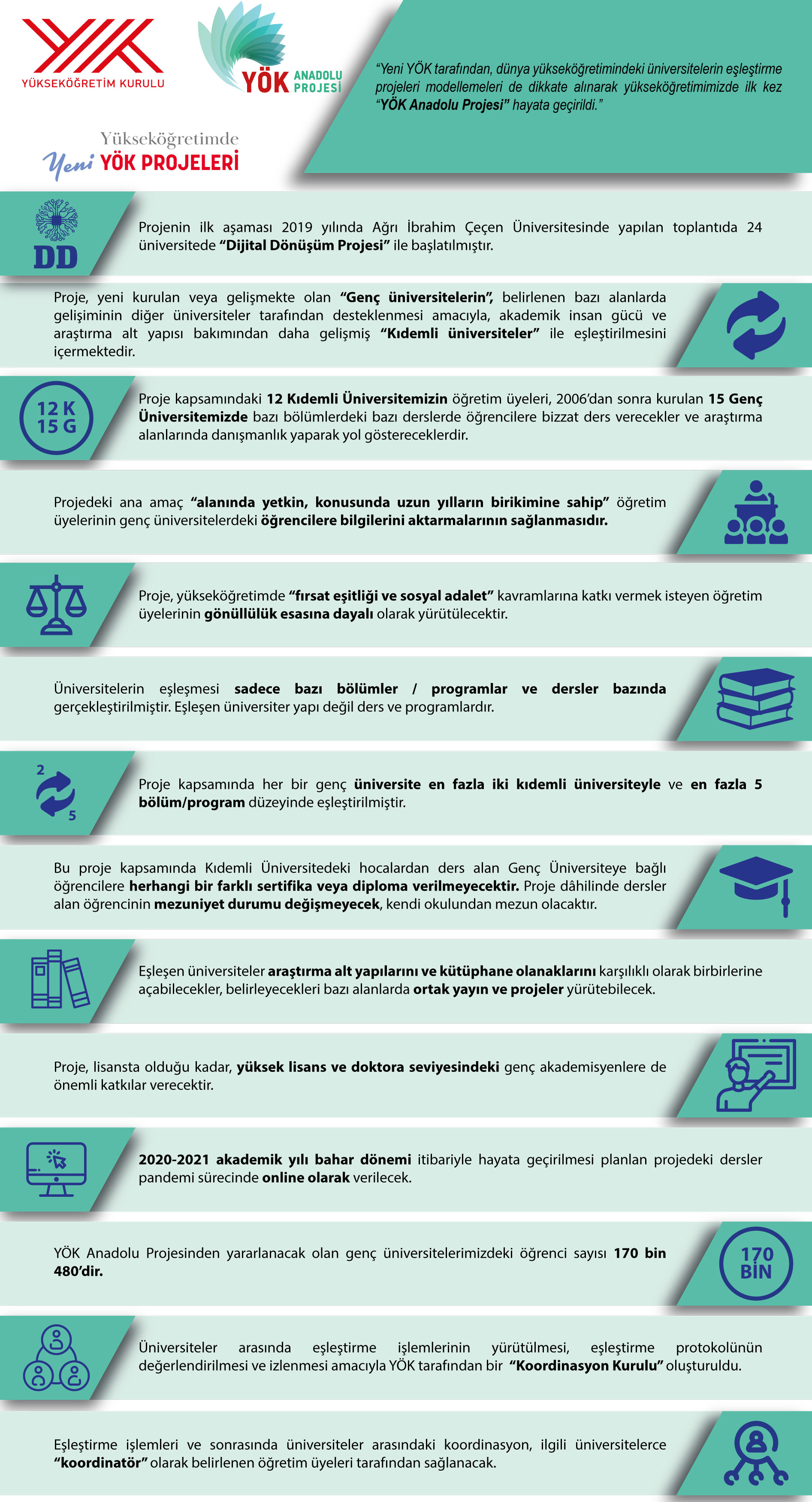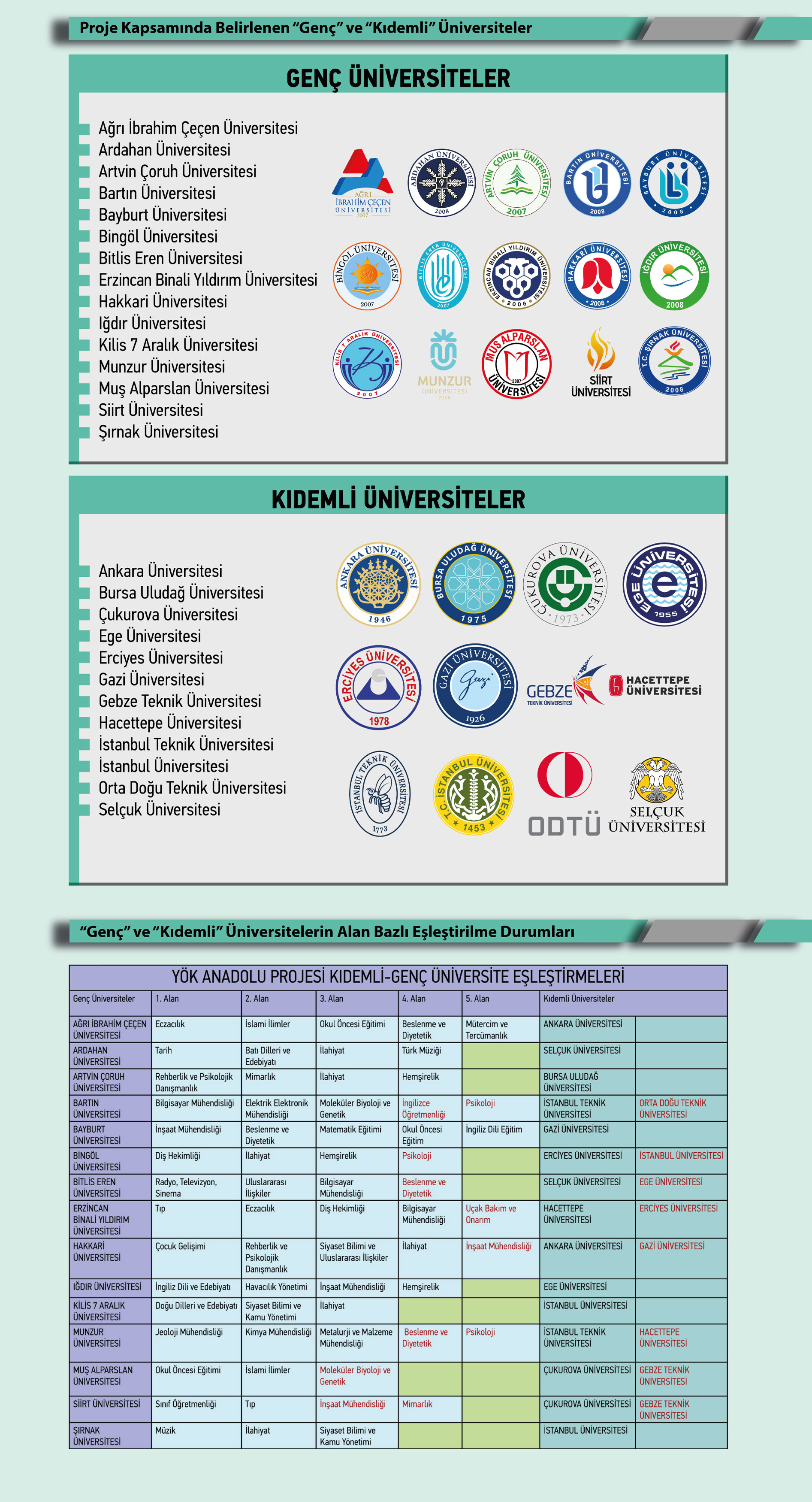YÖK Anatolia Project Promoted at Presidential Palace
February 4, 2021 / Presidential Palace
The introductory meeting of the “YÖK Anatolia Project”, which was shared for the first time with the public by President Recep Tayyip Erdoğan at the Opening Ceremony of the 2020-2021 Academic Year, was held at the Presidential Palace.
The meeting was held with the participation of President Erdoğan. Vice President Fuat Oktay, CoHE President Prof. M. A. Yekta Saraç, CoHE members, the relevant ministers and institution directors, and the rectors, department heads and project coordinators of the universities included in the project attended the meeting.
Firstly, a concert titled "Anatolian Tunes" was held by the conservatory students of Hacettepe University at the introduction meeting. Following the concert, the promotional film of the "YÖK Anatolia Project", which is about the support of more "established universities" for the "young universities" established after 2006 in terms of manpower and research infrastructures, was presented.
CoHE President Prof. M. A. Yekta Saraç made a speech at the opening of the event. He gave information about the works carried out by the “New CoHE” and shared details about the YÖK Anatolia Project. He stated that the New CoHE had been trying to reach the goal of Great Turkey, which was pointed out by President Recep Tayyip Erdoğan, with the projects which they had realized and share the outputs at the Presidential Palace every year.
President Saraç underlined that the Turkish higher education system, which had consisted of one-type universities that were similar to each other, now had universities with different missions such as Research Universities, Universities Aimed at Regional Development, Practice-oriented Universities, and Thematic Universities with the support of the President. He stated that the YÖK Anatolia Project allowed them to put the topic of interuniversity cooperation, which had been trending in the global higher education in recent years, into their agenda.
He noted that the YÖK Anatolia Project is one of the most developed projects with high scientific and social impact values, which have been carried out on the basis of the matching of universities following the examination of the examples in the world and the structures in Europe. He gave the good news that the project would start in the spring term.
CoHE President Saraç said that Anatolian universities were given specific missions at the end of competitions held under the Specialization Project Aimed at Regional Development every year and that they were supported in line with their missions. “These universities are also strengthened with other projects such as Digital Transformation. Today, we are stepping into a new stage. With the YÖK Anatolia Project, we will carry the academic and innovative knowledge of our established universities built over many years to our developing young universities,” he said.
He concluded his speech by expressing his gratitude to President Recep Tayyip Erdoğan for giving value to science and the world of science and for their support for the project.
Click here to watch the speech of CoHE President Saraç. (In Turkish)
Click here to read the full transcript of the speech made by CoHE President Prof. M. A. Yekta Saraç. (In Turkish)
President Recep Tayyip Erdoğan made a speech after the speech of CoHE President Saraç. He stated that he was extremely pleased with the realization of the YÖK Anatolia Project, which he announced at the opening of the 2020-2021 academic year.
He extended his thanks to those who contributed to the preparation of the project, CoHE in particular, and said that the Turkish higher education system had reached an advanced level today thanks to the investments they had made in infrastructures and human resources in the past 18 years.
- "We attach great importance to supporting newly-established universities"
He stated that he believed they would see more new universities in such lists in a short time and said, “It is important for us and our future to equip university students with the most advanced knowledge of the current era. To that end, we attach great importance to supporting newly-established universities in terms of academic and administrative staff positions determined for higher education."
He noted that the YÖK Anatolia Project aimed to make 15 universities selected from among the universities established after 2006 benefit from the human resources and infrastructures of 12 established universities that had become brands themselves.
"Students from 63 departments at 15 young Turkish universities, which are included in the project, will take some courses from the senior academics of 12 universities. The project aims to increase the quality of education and graduates. Similarly, we will ensure that young academics at these universities will be able to benefit from the research infrastructures of established universities, library facilities, and carry out joint publications and projects. In the light of the experiences gained in the first phase of the YÖK Anatolia Project, which was designed as an open-ended project, we will include other universities established after 2006. The prominent point is that the project is carried out voluntarily by senior faculty members at established universities,” he said.
On this occasion, Erdoğan also delivered the good news of another important project that CoHE would implement, and continued by saying, "The other project is the YÖK Academic Career Merit Project. It aims to enable the employment of people with doctorate degrees in the Turkish higher education system in a more transparent and merit-oriented way. All prospective academics, both Turkish nationals and foreign nationals, who have successfully completed their doctoral studies and Turkish universities looking for faculty members in line with their strategic goals will come together on this platform. We will implement this project as of next week. As a matter of fact, this project will also support the YÖK Anatolia Project. I wish this project will be beneficial to Turkish universities and academics."
Following the opening speeches, President Erdoğan and CoHE President Yekta Saraç participated in the photo shoot taken in two groups with the rectors of the "young" and "established" universities.
- Firstly, “young” and “established” universities were determined
Under the project, CoHE determined 15 state universities established after 2006 as “Young Universities” and 12 state universities, which were established before 2006 and are more developed in terms of manpower and research infrastructures in specific fields, as “Established Universities”.
Young Universities: Ağrı İbrahim Çeçen University, Ardahan University, Artvin Çoruh University, Bartın University, Bayburt University, Bingöl University, Bitlis Eren University, Erzincan Binali Yıldırım University, Hakkâri University, Iğdır University, Kilis 7 Aralık University, Munzur University, Muş Alparslan University, Siirt University and Şırnak University.
Established Universities: Ankara University, Bursa Uludağ University, Çukurova University, Ege University, Erciyes University, Gazi University, Gebze Teknik University, Hacettepe University, Istanbul Technical University, Istanbul University, Middle East Technical University and Selçuk University.
- About the Project
The first phase of the "YÖK Anatolia Project", which was developed by taking into account the modeling of the twinning projects of universities in the world, was initiated at 24 universities with the “Digital Transformation Project” in the meeting held at Ağrı İbrahim Çeçen University in 2018 and has been carried out successfully at 54 universities, which were established after 2006.
The “YÖK Anatolia Project”, which will be implemented for the first time in the Turkish higher education by the New CoHE, aims to twin newly-established or developing “young universities” with “established universities” that are more advanced in terms of academic manpower and research infrastructures in order to support the development of other universities in certain fields.
As a result of the preliminary studies carried out within the scope of the project, the twinning protocols between the young and established universities were signed, and the provisions regarding the fields, qualifications, student, academic and administrative staff mobility, education and training, R&D and project cooperation in the fields of the twinning were determined.
- Academics of established universities will give some of the courses in the specified departments
With the YÖK Anatolia Project, the faculty members of 12 established universities will personally give lectures to students of 15 young universities established after 2006 in some courses of the determined departments and will guide them in research fields. Universities will mutually open up their research infrastructures and library to each other.
The project will help young academics at undergraduate, graduate and doctoral levels greatly. The facilities of “Open Science - Open Access” and distance education at Turkish universities will also help implement the project during the pandemic.
The project, which will be carried out entirely on a voluntary basis, is planned to be launched by the spring term of the 2020-2021 academic year. The number of students at young universities that will benefit from the project is 170 thousand 480.
- What does the twinning protocol include?
- A university will be able to make a twinning protocol with maximum two universities,
- Twinning between two universities can be made for maximum 5 departments/programs,
- Students at young universities will be able to benefit from the courses offered at established universities,
- It will be ensured that senior faculty members at established universities teach in the programs of young universities in the determined fields,
- The facilities of education and research infrastructures, and libraries of the matched universities will be used mutually,
- Planning will be made to transfer the knowledge and experience of established universities to young universities,
- Matched universities will be able to carry out joint publications and projects in the fields of their choice,
- CoHE will have the right to terminate the twinning according to the results of the annual monitoring and evaluation reports of the Coordination Board.
- The twinning status of “young” and “established” universities in the project
For instance, while Hakkari University, which was designated as a young university within the scope of the project, was twinned with Ankara University for the fields of Child Development, Psychological Counseling and GuidancePolitical Science and International Relations, and Theology, it was also twinned with Gazi University for the field of Civil Engineering. Therefore, students studying in these fields at Hakkari University will be able to take courses from the academics of the established universities their university is matched with.
- A Coordination Board was established for the follow-up of the project
CoHE established the Coordination Board to carry out twinning procedures between universities, and to evaluate and monitor the twinning protocols.
The Coordination Board will request an annual report from the matched universities, and make site visits when necessary. The report prepared as a result of the examinations will be submitted to the Council of Higher Education. The twinning procedures and the coordination between universities will be made by the faculty members determined as coordinators by the relevant universities.
Click here for the booklet entitled “YÖK Anatolia Project”.

